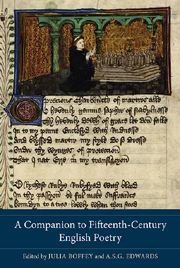Book contents
- Frontmatter
- Contents
- List of Contributors
- List of Abbreviations
- Conventions
- Introduction
- Part I Background and Context
- Part II Authors
- Part III Themes and Genres
- 11 Fifteenth-Century Chaucerian Visions
- 12 Historical and Political Verse
- 13 Classical and Humanist Translations
- 14 Romance
- 15 Scientific and Encyclopaedic Verse
- 16 Popular Verse Tales
- 17 Beyond the Fifteenth Century
- Chronology
- Index of Manuscripts
- General Index
11 - Fifteenth-Century Chaucerian Visions
from Part III - Themes and Genres
Published online by Cambridge University Press: 05 July 2013
- Frontmatter
- Contents
- List of Contributors
- List of Abbreviations
- Conventions
- Introduction
- Part I Background and Context
- Part II Authors
- Part III Themes and Genres
- 11 Fifteenth-Century Chaucerian Visions
- 12 Historical and Political Verse
- 13 Classical and Humanist Translations
- 14 Romance
- 15 Scientific and Encyclopaedic Verse
- 16 Popular Verse Tales
- 17 Beyond the Fifteenth Century
- Chronology
- Index of Manuscripts
- General Index
Summary
This chapter is devoted to a group of Chaucerian visions: The Flower and the Leaf, The Assembly of Ladies, La Belle Dame sans Mercy and The Isle of Ladies. ‘Chaucerian’ has been a common epithet for these poems in modern scholarship ever since Skeat edited all of them except The Isle of Ladies in his collection Chaucerian and Other Pieces (1897). The association of these poems (and others) with Chaucer, however, goes back much further, to scribal attributions in medieval manuscripts and to Chaucer's earliest printers, who naturally had an interest in presenting as wide a corpus as possible (see Robbins 1973; Forni 2001b).
Although today the earliest surviving witness for The Flower and the Leaf is an early edition of Chaucer's works by Thomas Speght (1598, STC 5077), the poem once existed in Longleat, MS 258, as we know from the original table of contents of this manuscript (Hammond 1905). Unfortunately, the quire containing the poem was removed from the manuscript at an early date. Written in the Chaucerian rhyme royal stanza, the poem is a fine example of a courtly poem reflecting the leisured aristocratic life. One popular variation on the aristocratic ‘Game of Love’ (Stevens 1961: 152–202) was for courtiers to divide themselves in May-time into two camps, the order of the Flower (those looking for love or new lovers) and that of the Leaf (those who were not). The title of our poem evidently alludes to that game.
- Type
- Chapter
- Information
- A Companion to Fifteenth-Century English Poetry , pp. 145 - 156Publisher: Boydell & BrewerPrint publication year: 2013



